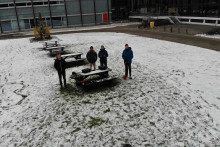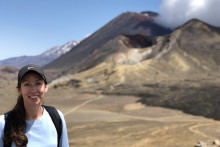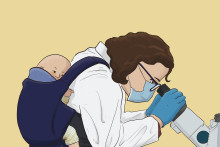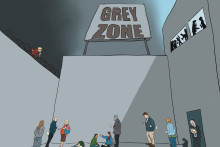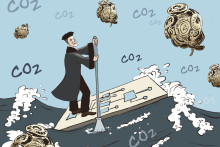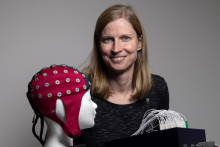- EN
- NL
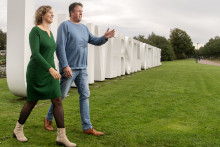 Science
Science‘Burgeronderzoek is democratisering van de wetenschap’
Het onderzoeksprogramma ‘Samen aan de slag met burgeronderzoek in Twente’ is uit de startblokken. Met financiële steun van de Provincie Overijssel zijn vijf ingediende burgerwetenschapsprojecten beloond, elk met een bedrag van maximaal 10.000 euro. Samen met Twentse burgers stropen UT-onderzoekers de mouwen op om waardevolle onderzoeksresultaten te realiseren.
- EN
- NL
 Science
Science‘Citizen research is the democratisation of science’
The UT’s new research programme ‘Civic and Citizen Science’ is off to a good start. With financial support from the Province of Overijssel, five submitted citizen science projects have been rewarded with up to 10,000 euros each. Together with Twente inhabitants, UT scientists are rolling up their sleeves and working towards valuable research results.
- EN
- NL
 Science
ScienceProeffabriek op boerderij voor onderzoek naar zuiveren biogas
Biogas (dat methaan bevat) kan een alternatief zijn voor fossiel gas, maar vervuiling met CO2 beperkt het gebruik ervan. Promovendus Niels Mendel van de Fysica van Complexe Vloeistoffen en de Duurzame Procestechnologie groep ontwikkelde een methode om dit CO2 efficiënt te verwijderen met kleikorrels. Hierdoor verminderen emissies en sluiten kringlopen. Dit jaar wordt zijn methode opgeschaald en de eerste proeffabriek gebouwd.
- EN
- NL
 Science
SciencePilot plant on farm for research on purifying biogas
Biogas (containing methane), can be an alternative for fossil gas, but the contamination with CO2 limits its use. PhD researcher Niels Mendel, of the Physics of Complex Fluids and the Sustainable Process Technology group, developed a proof of principle to efficiently remove CO2 by using clay pellets, and reuse it subsequently. This reduces emissions and closes cycles. This year, his experimental design will be scaled and the first pilot plant be build.
- EN
- NL
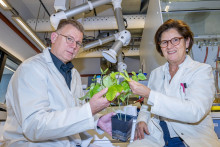 Science
ScienceZelfgefabriceerde eiwitomhulsels kunnen nog meer medische toepassingen hebben
In een internationale samenwerking heeft professor Jeroen Cornelissen, van de afdeling Molecules & Materials een methode ontwikkeld om eiwitomhulsels in allerlei vormen te maken door viruseiwitten om een DNA-vorm te vouwen. Deze holle eiwitstructuren worden onder meer gebruikt bij het bestrijden van plantenziekten, maar ook voor het nauwkeurig toedienen van medicijnen in het lichaam.
- EN
- NL
 Science
ScienceSelf-manufactured protein envelopes may have even more medical applications
In an international collaboration, Professor Jeroen Cornelissen, from the Department of Molecules & Materials, developed a method to create nano-scale protein casings in a variety of shapes, by folding virus proteins around a DNA mold. These hollow protein structures may be utilized for a variety of applications, for example, in fighting plant diseases, but also for precise delivery of medication in the body.
- EN
- NL
 Science
ScienceLopen, rennen en zelfs klimmen met een bionisch been
Binnen het EU-project Simbionics ontwikkelt een team van wetenschappers een bionische beenprothese om het lopen van patiënten na een amputatie te verbeteren. UT’ers Herman van der Kooij en Massimo Sartori werken mee.
- EN
- NL
 Science
ScienceWalking, running and even climbing with a bionic leg
Within the EU project Simbionics, a team of scientists is developing a bionic leg prosthesis to improve walking for patients after amputation. UT professors Herman van der Kooij and Massimo Sartori are participating.
- EN
- NL
 Science
Science‘Onderzoek naar topologisch isolerende materialen kan een revolutie teweegbrengen’
Topologische isolatoren zijn veelbelovende materialen voor toepassing in elektronica omdat ze elektriciteit efficiënt geleiden, waardoor het energieverbruik daalt. Ook gebruik in computerchips is mogelijk, en er zijn veelbelovende toepassingen in kwantumcomputers. Hun toepassing in consumentenproducten is echter een hele uitdaging, omdat ze alleen functioneren bij zeer lage temperaturen.
- EN
- NL
 Science
Science'Research into topologically insulating materials can revolutionize’
Topological insulators are promising materials for application in electronics because they efficiently conduct electricity, reducing energy consumption. Use in computer chips is also possible, and there are promising uses in quantum computers. Their application in consumer products is very challenging though, since they only function at very low temperatures.
- EN
- NL
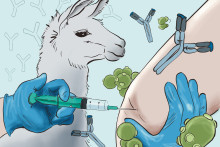 Science
ScienceLamabloed om pijn atrosepatiënten te verlichten
Veel lamabloed bevat antilichamen die de pijn van artrosepatiënten misschien kunnen verlichten. UT-hoogleraar Marcel Karperien werkt aan een technologie om deze antilichamen toe te dienen. Hoewel de combinatie van wetenschap en ondernemen soms leidt tot botsende belangen, hebben universiteit en bedrijfsleven elkaar volgens Karperien hard nodig.
- EN
- NL
 Science
ScienceUsing llama blood to relieve osteoarthritis pain
Llama blood contains antibodies that may potentially relieve the pain of osteoarthritis patients. UT professor Marcel Karperien is working on a technology to administer these antibodies. Although the combination of science and entrepreneurship sometimes leads to clashing interests, Karperien says that the university and business community sorely need each other.
